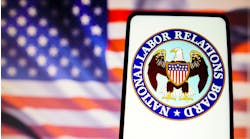Social media has been a hot topic in the news. Twitter, Google and Facebook are under attack by both the right and the left, alternately accused of censoring the views of people whose political philosophy they and their employees dislike, and of not doing enough to rid their sites of hate speech.
This controversy was already well in view before the death of George Floyd grabbed the headlines and generated a national uproar, but since then the controversy has exploded in terms of passion and prominence. At a time when the presidential campaign is heating up that includes the first U.S. President to wield Twitter as his primary communications tool, don’t expect controversies arising from the widespread use and abuse of social media to go away soon.
For employers trying to maintain peace in the workplace, one question arises anew: How much control can they legally exert over their employees’ postings on these websites? Employers do have recourse in many situations, but they must keep an eye out for where the landmines are buried and proceed with care, argue attorneys for the law firm of Ogletree Deakins.
“In most cases, employers can take actions against their employees’ racist off-duty conduct, and employers may need to do so to avoid legal liability and, probably more importantly, to maintain a culture of inclusion,” they explain.
Employees generally choose to post on their own personal social media pages and frequently do so when not at work. The attorneys note that complaints about offensive comments that employees have posted on social media platforms continue to rise, originating with colleagues, co-workers, customers, community members and other companies.
Keep in mind that an employer can face substantial liability if it is aware of discriminatory harassment—even if the offending remarks were posted through an employee’s personal social media presence and outside of working hours—if the conduct is found to have created a hostile work environment.
“Unfortunately, some of these posts are inflammatory, derogatory, offensive or racist,” they point out “While sometimes the conduct is so severe that employers can easily determine the appropriate consequences, in other cases employers must balance a variety of legal requirements, employee and public relations concerns, and their own company values.”
Do private-sector employees have a right to free speech that allows them to make racist or other inflammatory posts or comments? The answer is no, the attorneys state. Employees may believe their statements are protected under the First Amendment when in fact it only prohibits the federal government from interfering with freedom of speech—it does not guarantee that right in private settings, including private workplaces.
As a result, a private-sector employee’s comments, whether made in person or in writing on social media, are not shielded from employment consequences under the first amendment.
In fact, it is not uncommon for private sector employees to be fired for such posts. As of now, California, Colorado, Louisiana, New York and North Dakota prohibit employers from firing or retaliating against employees for any off-duty lawful activity, including speech. However, even in these states, online speech attacking other persons’ immutable characteristics protected by law (such as age, race, ethnicity, sex and religion) or constitutes workplace harassment and is not protected under these laws.
Employers may not be able to police everything that their employees do outside of work, but that changes once someone may complain to an employer or calls attention to an employee’s off-duty comments or actions. When that happens, it immediately becomes the employer’s concern. according to the attorneys.
What Is a Firing Offense?
Employees may be subject to disciplinary action—up to and incorporating termination—for social media posts promoting hate speech against any kind of protected class or that creates a hostile work environment for members of those protected classes; making threats of violence; and revealing trade secrets or any other confidential and proprietary company information.
Among cases cited by the attorneys was one where an employee was discharged after a video went viral showing her, outside of work, making racist threats to a man in New York City’s Central Park. Another employee was fired when a video emerged of him confronting a man who was stenciling a human rights statement on his own property.
However, employers need to be careful when discharging employees who make offensive posts or engage in protests that are expressly political in nature. More than a dozen states and jurisdictions prohibit employers from retaliating against employees for engaging in political activities, including public protests. Among them are California, Colorado, Guam, Louisiana, Minnesota, Missouri, Nebraska, Nevada, South Carolina, Utah, West Virginia, Seattle and Madison, Wis.
Other jurisdictions ban discrimination that is based on the employees’ political party affiliation or for engaging in election-related speech and political activities. Those include New York, Illinois, Washington, DC, Utah, Iowa, Louisiana, Puerto Rico, the Virgin Islands and Broward County (Miami), Fla.
Employers also need to watch out for employee discussions of their wages and working conditions, which are protected by federal labor law even when it comes to employees who are not union members. However, the National Labor Relations Board under President Trump has steadily whittled away some of the protections that were added by the Obama-era board, and even when it occurs in this context, workers cannot get away with abusive or threatening speech.
Other federal employment laws are designed to protect employees from retaliation for claiming that their rights have been violated, the attorneys warn. If an employee complains online about workplace discrimination, sexual harassment or other employer violations, that person usually is protected from retaliation.
The Ogletree Deakins lawyers also recommend that employers consider adopting social media use policies that address inappropriate and offensive conduct.
For example, employers can tell workers that their personal social media accounts, online networking accounts, blogs and other online communications may be reviewed, and that any inappropriate or offensive content could subject them to discipline up to and including termination.
Employers may want to communicate in the policy descriptions what types of content could create problems, including harassing and bullying behavior or discriminatory or offensive language. Problematic use of social media also can cover online conduct that may be associated with the company or that could potentially cause interpersonal problems in the workplace.
Other actions employers can consider taking include communicating to employees a statement about the company’s core values so that they know which behaviors can violate organizational principles. “Remind employees of the avenues to report inappropriate conduct if they experience or learn of it,” the lawyers add.
Many companies have publicly issued corporate statements regarding their commitments to tolerance, diversity, social justice and anti-racism, they observe, emphasizing that it is appropriate for companies to enact policies, procedures and training requirements intended to ensure that their actions are consistent with the values expressed.
Also make sure to promptly investigate any reports of potentially problematic social media posts or other conduct. “As with all employment policies, employers can face liability if they do not enforce their social media use policies consistently,” the attorneys stress. “If employees are treated differently for the same or similar conduct without legitimate non-discriminatory explanations, employers may face a risk of employment discrimination claims.”




